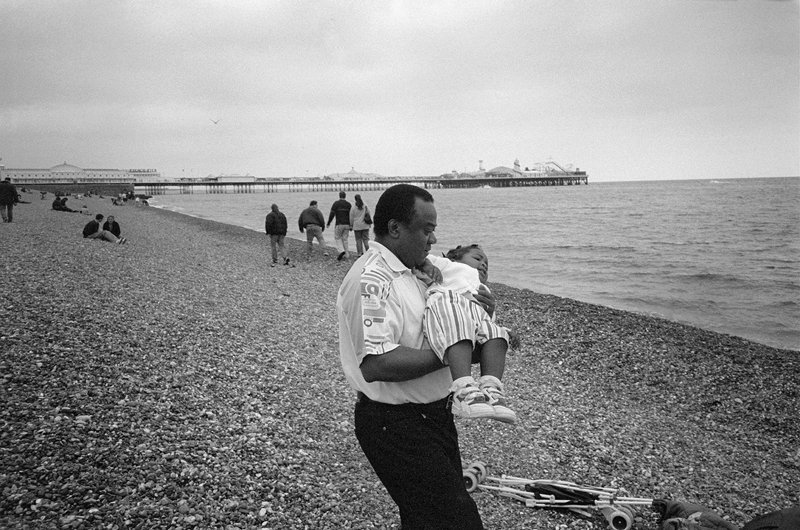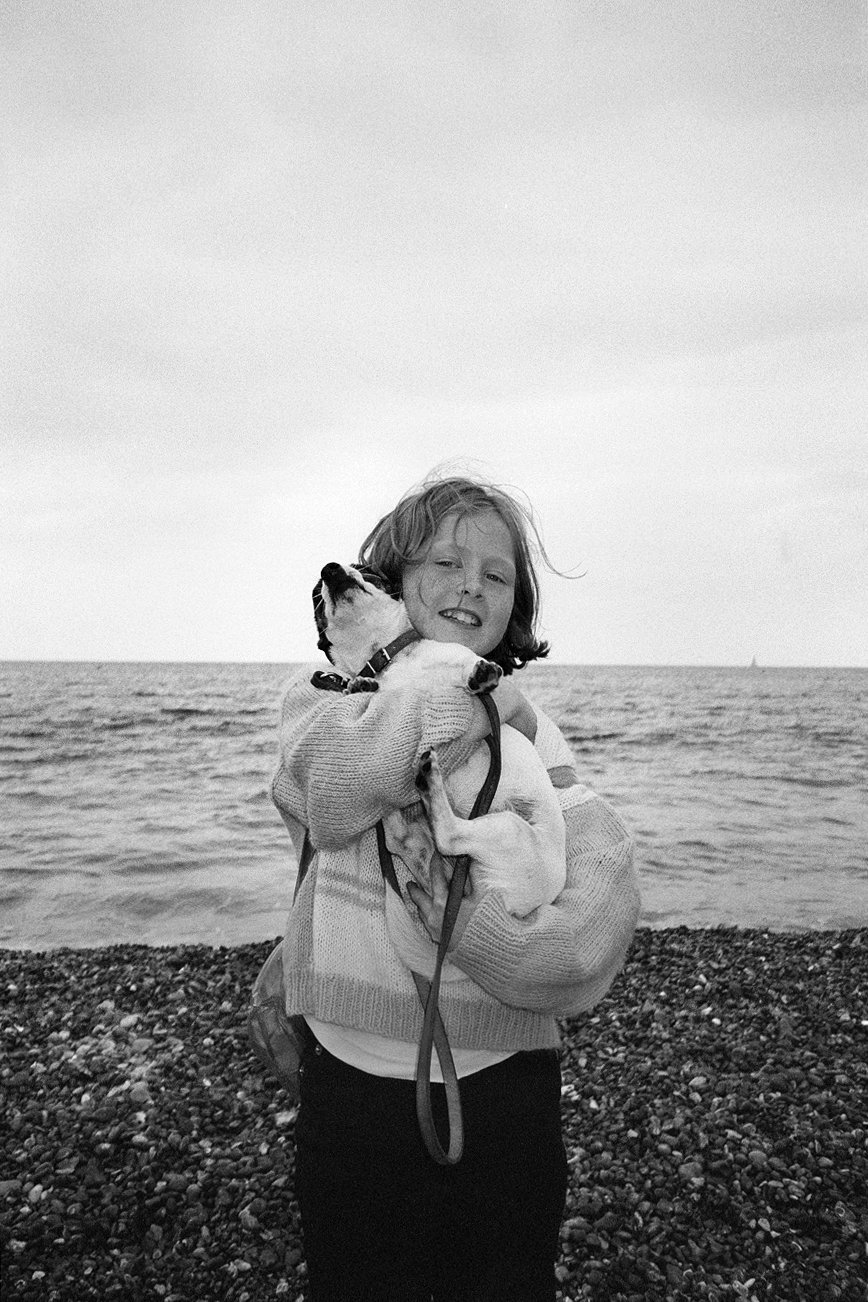Weekend (or: The Eternal Silence of these infinite spaces terrifies me)
The eternal silence of these infinite spaces terrifies me (no. 233 in the Pensées of Blaise Pascal). This could be the text around which Eleni Mouzakiti has arranged her suite of pictures, taken on the south coast of England. Pascal was troubled by the idea of that huge elsewhere of infinite spaces. It was beyond the scope of mere rationality. Only by invoking God could the horror of the ‘eternal silence’ be diminished. God is acknowledged here in the original series of these images, and in particular in one scene where a man carries a child towards the water’s edge, as if in preparation for a Baptism. There is also a girl who stands on the shore, hugging a squirming dog, in some subliminal reference to the Virgin and Child.
The photographer doesn’t insist on these liturgical elements. They are only there to be noticed if you are predisposed to religious readings. But of course, once they have been noticed the whole work begins to take shape, and it becomes hard to resist the idea that it is quite consciously intended. An evening skyline along a windblown hilltop; a strip of darkening sea looking like the skin of a prehistoric beast. These two pictures, put in almost like notes in a glossary seem to stand respectively for those ‘infinite spaces’ of Pascal and for Redemption and Baptism, or for some of those saving elements traditionally associated with water. Once this idea has been put in place it becomes tempting to think of the first picture in the set as a sidelong or discreet reference to the Flood, for it seems to show the earth tilted with a veritable hillside of water. Pouring towards the shore and towards a pair of figures, one of whom turns on his hills as if to make a gateway.
You might then go on to think of the whole as a catalogue of responses to the transcendental figure made by the conjunction of land and sea. Infinity lies along and beyond the horizon, but unless you are sustained by Pascal’s sure knowledge of God it has disturbing implications. We take refuge in each other’s company, paying attention and responding; and there are a number of conversation pieces here, large and small, from family groups to crowd scenes. Familial and social intimacies, the pictures seem to suggest, help us to shut out the thought of ‘eternal silence’. Of course, it may also be true that our preoccupations with each other are, in some very fundamental way, forced on us and inculcated by that disquieting idea of the great elsewhere. Significantly, perhaps, the bleakest as well as the most sublime picture in the set figures a dog on the sea’s edge looking out towards the long line of the horizon. Humanity, on the other hand, and as a sign of a privileged and superior status has learned how to cope, engrossed in conversation and in short-term family matters. If these pictures are to be compared it might be to Robert Frank’s “The Americans”, a great venture from the 1950’s and so looked up to nowadays as to be almost beyond compare. “The Americans” though, was always something of a religious document. Frank’s personnel live amongst scuttered religious emblems, almost as if the culture has come to ruin. Indeed, it is often a melancholic vision of men, women and children, alienated and retired into themselves, scarcely even aware of Pascal’ s ‘infinite spaces’. Eleni Mouzakiti’s investigation of the situation goes, as it were, further back and even right to the beginning, when we were first conscious of all that vastness out there beyond the horizon. She thinks of origins, and offers an explanation. Frank by contrast, remarks on an outcome and on what might be called an endgame – thinking of Samuel Becketts “Endgame”, published in the English in 1958 and more or less contemporaneous with “The Americans”.
The play “Endgame” is set – with reference to the Mouzakiti suite – in an enclosed room with high windows from which Clov, Hamm’s servant, is able to scan the sea with a telescope. Clov’s vision of the whole is of something dead (corpse in his word), with nothing on the horizon, the waves like lead and the sun given way to an overall greyness. Hamm, Clov’s blind master, had hoped for something more, for a trace of the sublime in his servant’s report; he had hoped, in fact, for just the kind of tone of voice which characterises the Mouzakiti suit.
What is otherwise notable about this set of pictures is that it seems to be explicitly intended with a subject and a development. As a general rule poet-photographers commit themselves to a particular social moment. `they think of themselves as agents, able to express a quality implicit in the moment. Time, though moves on and they often left at a loss. Eleni Mouzakiti’s art reflects a different turn of mind, one interested in seeing beyond the here and now and of taking account of the human condition in general. These pictures, as delicate and snapshot-like as they are, refer far beyond the age of the camera and could take their place with all those Creation series which we like to think of as only at home in religious art from long ago.
Ian Jeffrey*
(Ian Jeffrey is an Art historian and photographic critic)

